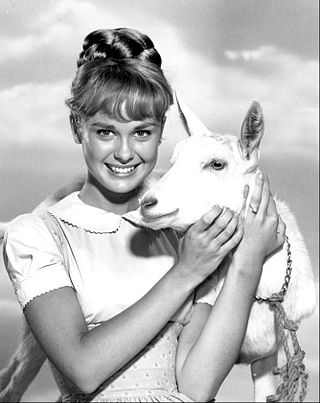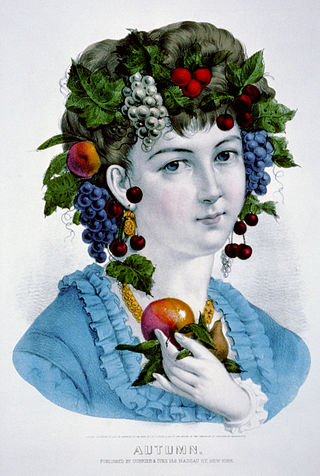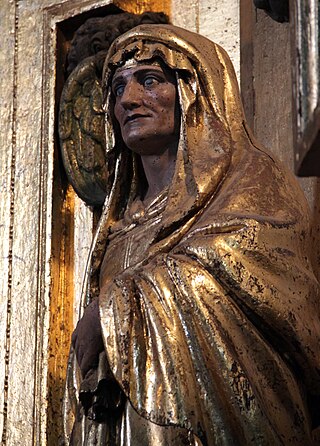
Chloe, also spelled Chloë, Chlöe, or Chloé, is a feminine name meaning "blooming" or "fertility" in Greek. The name ultimately derives, through Greek, from the Proto-Indo-European root *ǵʰelh₃-, which relates to the colors yellow and green. The common scientific prefix chloro- derives from the same Greek root. In Greek the word refers to the young, green foliage or shoots of plants in spring.
Amy is an English feminine given name, the English version of the French Aimée, which means beloved. It was used as a diminutive of the Latin name Amata, a name derived from the passive participle of amare, “to love”. The name has been in use in the Anglosphere since the Middle Ages. It was among the 50 most popular names for girls in England between 1538 and 1700. It was popularized in the 19th century in the Anglosphere by a character in Sir Walter Scott's 1821 novel Kenilworth, which was based on the story of Amy Robsart. Enslaved Black women in the United States prior to the American Civil War were more likely to bear the name than white American women because slave masters often chose their names from literary sources. The name declined in use after 1880 but was revived due to the hit song Once in Love with Amy from the 1948 Broadway musical Where's Charley?. The name peaked in usage in the United States between 1973 and 1976, when it was among the five most popular names for American girls. It remained among the top 250 names for American girls in the early 2020s.

Bonnie is a Scottish given name and is sometimes used as a descriptive reference, as in the Scottish folk song, My Bonnie Lies over the Ocean or Bonnie Dundee about John Graham, 7th Laird of Claverhouse. It comes from the Scots language word "bonnie", or the French bonne (good). That is in turn derived from the Latin word "bonus" (good). The name can also be used as a pet form of Bonita.
Kaylee is a given name, most often for females. The name is a modern English combination of the name elements Kay and Lee.
Mabel is an English female name derived from the Latin amabilis, "lovable, dear".

Brian is a male given name of Irish and Breton origin, as well as a surname of Occitan origin. It is common in the English-speaking world.
Chelsea is a female given name of 20th-century coinage. It is pronounced, or, and sometimes spelled Chelsie or Chelsey. In the United States, the spelling "Chelsea" first entered the Social Security Administration baby naming data chart in 1969 at position 708. It rose in popularity among names for girls after 1980, peaking in 1992 at #15. As of 2009 it was ranked #231.
Ariana is a feminine given name, popular in many languages. Arianna and Ariane are the two most common variations.
Madison is a surname of English origin that has become a popular given name in the United States, and to a lesser extent in Canada. Madison, also spelled Maddison, is a variant of Mathieson, meaning son of Matthew. A different origin is alleged by some where Maddy is assumed to be the pet form of Maud and therefore the meaning is son of Maude.
Ashley is a given name which was originally an Old English surname. It is derived from the Old English (Anglo-Saxon) words æsċ (ash) and lēah and translates to "Dweller near the ash tree meadow".
Jacqueline is a given name, the French feminine form of Jacques, also commonly used in the English-speaking world. Older forms and variant spellings were sometimes given to men.

Tammy is a feminine given name. It can be a short form of the names Tamsin, Thomasina, Thomasin, or Tamar, Tamara or other names starting with Tam. Tamsin, Thomasina, and Thomasin are feminine versions of the name Thomas, a Greek form of the Aramaic name Te'oma, meaning twin. Tamara is a Russian form of the Hebrew name Tamar, which means "palm tree". In Israel "Tami" (תמי) is commonly used as an abbreviation of the original Hebrew name.

Autumn is a feminine given name derived from the Latin word autumnus, meaning "fall" or "autumn".
Cassidy is a surname name derived from an Irish surname and ultimately from the Gaelic given name Caiside, meaning "clever" or "curly-haired." The name Caiside comes from the Irish word element cas.
Alison is a unisex given name, primarily a feminine name in English-speaking countries. It was originally a medieval French nickname for Alis, an old form of Alice derived with the suffix -on or -son sometimes used in the former French nicknames. The Middle English form was Alisoun.
Luna is a feminine given name of Latin origin, meaning moon. In Roman mythology, Luna was the divine personification of the Moon.

Naomi or Noemi is a given name of both biblical Hebrew and (separately) Japanese origin, used in various languages and cultures.

Reina, which is also spelled Raina, Rayna, or Reyna in English, is a feminine given name with multiple, unrelated origins from a number of different languages and cultures. All of these unrelated names are pronounced and written similarly in English.
Nova is a given name of Latin origin meaning "new".

Maxine is an English feminine given name created as a feminine version of the name Max.








